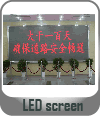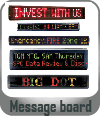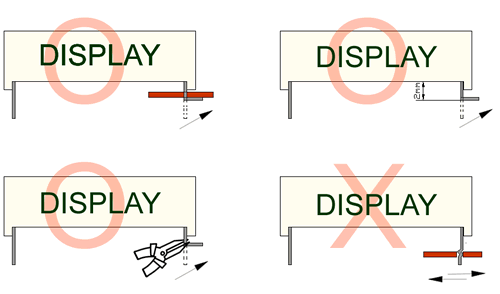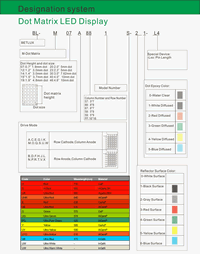1.2 inch height 8×8 LED dot matrix, bi-color
Series No:
Weight:(g/pcs)
Dimension:(mm)
Dot height:(mm)
Dot pitch:(mm)
Dot size:(mm)
Specification:
Inquiry
Description:
Introduction
In the evolving landscape of electronic display technology, the 1.2 inch height 8×8 LED dot matrix, bi-color stands out as a crucial component for innovative design. Commonly used in control panel displays, this bicolor LED offers flexibility and vibrant visual communication, making it an indispensable tool for electronics manufacturers. Known also as an 8×8 RGB LED matrix, this technology enables developers to create multi-colored displays within a compact space, enhancing user interfaces across a variety of devices.
What Is a 1.2 Inch Bi-Color LED Dot Matrix?
The 1.2 inch bi-color LED dot matrix combines two LEDs in each dot, allowing each pixel to display two distinct colors. This integration provides the capability to create more detailed and visually appealing displays without occupying a significant amount of physical space, which is particularly valuable in compact electronics such as handheld devices.
Key Features of the 1.2 Inch 8×8 Bi-Color LED Dot Matrix
- Dual-Color Flexibility: Each LED can emit two different colors, significantly expanding the range of visual designs and alerts that can be communicated.
- Energy Efficiency: LEDs are highly energy efficient, reducing the power requirements for devices.
- High Durability: LED technology is known for its longevity, ensuring that displays last longer even under continuous use.
Applications of the Bi-Color 8×8 LED Dot Matrix
This versatile component is utilized in several innovative ways:
- Consumer Electronics: Mobile phones, portable gaming devices, and personal digital assistants.
- Industrial Equipment: Machinery control panels where operators benefit from clear, multicolor instructions.
- Healthcare Devices: Critical monitoring equipment where different colors indicate various levels of urgency.
Benefits of Using the 1.2 Inch 8×8 Bi-Color LED Dot Matrix
The adoption of the bi-color matrix within electronics manufacturing brings several advantages:
- Enhanced Display Capabilities: Allows for the display of complex symbols and custom icons, enhancing both the aesthetic and functional value of any device.
- Improved User Experience: Multicolor displays are easier to read and can convey information more effectively, which is crucial for safety and usability.
- Cost Efficiency: Reduces the need for multiple components, simplifying design and lowering manufacturing costs.
Case Studies
- Automotive Dashboard: An automotive company integrated the 1.2 inch bi-color matrix into their new vehicle dashboards, providing drivers with clear, color-coded alerts regarding vehicle performance.
- Smart Home Systems: A leading manufacturer of smart home devices used these matrices in their systems to indicate different system statuses effectively, improving user interaction and satisfaction.
User Testimonials
- Product Engineer: “The flexibility and reliability of the bi-color LED matrix allowed us to drastically improve the interface of our latest handheld diagnostic tool.”
- Design Specialist, Consumer Electronics: “Integrating the bi-color matrix into our devices not only enhanced their functionality but also significantly elevated their market appeal.”
Conclusion
The 1.2 inch height 8×8 LED dot matrix, bi-color is transforming the landscape of electronic displays, providing engineers and designers with the tools they need to innovate and captivate. Its compact size, combined with its dynamic color capabilities, makes it an ideal choice for any application requiring high-quality, reliable visual output.
Call to Action: Are you ready to enhance your product designs with the latest in display technology? Contact us today to see how our bi-color LED dot matrices can make a visible difference in your next project!

Features
- Matrix Size: With a height of 31.00mm and a display width and height of 32.00×32.00mm, this matrix is compact yet effective for various display needs.
- Dot Characteristics: The matrix has a dot size of 3.00mm, circular in shape, providing distinct and clear illumination.
- Grid Configuration: It features an 8 column by 8 row layout, offering a balanced and square display area for various applications.
- Bi-Color Functionality: The matrix supports bi-color displays, allowing for more versatile and visually appealing designs.
- Low Power Consumption: Designed for low current operation, it’s energy-efficient and suitable for long-term use.
- High Contrast and Brightness: Ensures excellent visibility in various lighting conditions, enhancing readability.
- Coding Compatibility: Compatible with ASCII and EBCDIC codes, offering flexibility for different programming and display purposes.
- Horizontal Stackability: It can be horizontally stacked, facilitating the creation of larger displays by combining multiple matrices.
- Anode/Cathode Options: Available with both column cathode and anode configurations, providing versatility in electronic designs.
- Easy Installation: Designed for easy mounting on printed circuit boards or sockets, making it user-friendly for various projects.
- Luminous Intensity Consistency: The LEDs are categorized for luminous intensity, ensuring uniform brightness across the matrix.
- Durability: Technically rugged, this matrix is built to withstand various operational conditions.
- Aesthetic Design: Featuring a standard gray surface with white dots, it offers a sleek and professional look.
- Environmental Compliance: RoHS compliance indicates environmentally responsible manufacturing.
Applications
- Electronic Signage and Displays: Ideal for creating dynamic and eye-catching signs for businesses, events, or public information.
- Information Panels: Suitable for displaying information in public transport systems, control rooms, or other public spaces.
- Interactive Projects: Can be used in interactive art installations, educational tools, or DIY electronics projects.
- Gaming and Entertainment: Appropriate for gaming consoles, toys, and other entertainment devices needing a compact display.
- Educational Purposes: Great for use in teaching electronics and programming, especially in projects involving visual outputs.
- Custom Interfaces: Perfect for building custom control panels, indicators, or interfaces in various electronic devices.
- Prototyping and Experimentation: Useful in prototyping electronics, especially where space is limited but a clear display is necessary.
- Portable Devices: Due to its size and low power requirements, it’s well-suited for portable electronic devices.


Electrical-optical characteristics:
Part No.(Row Cathode) | Part No. (Row Anode) | Color | Material | Peak Wavelength (nm) | Voltage typ. (v) | Voltage Max. (v) | Luminous Min. | Luminous typ. |
|---|---|---|---|---|---|---|---|---|
BL-M12A882DUG (D) |
BL-M12B882DUG (D) |
Ultra Red |
AlGaInP |
660 |
2.5 |
320 |
||
BL-M12A882DUG (UG) |
BL-M12B882DUG (UG) |
Ultra Green |
AlGaInP |
574 |
2.5 |
250 |
||
BL-M12A882EG (E) |
BL-M12B882EG (E) |
Orange |
GaAsP/GaP |
635 |
2.5 |
190 |
||
BL-M12A882EG (G) |
BL-M12B882EG (G) |
Green |
GaP/GaP |
570 |
2.5 |
195 |
||
BL-M12A882EG |
BL-M12B882EG |
Orange |
GaAsP/GaP |
635 |
2.5 |
140 |
190 |
|
BL-M12A882EG |
BL-M12B882EG |
Green |
GaP/GaP |
570 |
2.5 |
150 |
195 |
|
BL-M12A882SG (G) |
BL-M12B882SG (G) |
Green |
GaP/GaP |
570 |
2.5 |
195 |
||
BL-M12A882SG (S) |
BL-M12B882SG (S) |
Super Red |
AlGaInP |
660 |
2.5 |
200 |
||
BL-M12A882SG |
BL-M12B882SG |
Hi Red |
GaAlAs/SH |
660 |
2.2 |
150 |
200 |
|
BL-M12A882SG |
BL-M12B882SG |
Green |
GaP/GaP |
570 |
2.5 |
150 |
195 |
|
BL-M12A882UEUG (UE) |
BL-M12B882UEUG (UE) |
Ultra Orange |
AlGaInP |
630 |
2.5 |
235 |
||
BL-M12A882UEUG (UG) |
BL-M12B882UEUG (UG) |
Ultra Green |
AlGaInP |
574 |
2.5 |
250 |
Package configuration & Internal circuit diagram
Partno description:
More Information
Reflector Surface color (1st number)/ dot Lens color (2nd number):
| Number | 0 | 1 | 2 | 3 | 4 | 5 |
| Ref Surface Color | White | Black | Gray | Red | Green | |
| Dot Epoxy Color | Water clear | White diffused | Red Diffused | Green Diffused | Yellow Diffused |
Absolute maximum ratings (Ta= 25°C)
| Parameter | S | D | UR | E | Y | G | Unit | |
| Forward Current IF | 25 | 25 | 25 | 25 | 25 | 30 | mA | |
| Power Dissipation Pd | 60 | 60 | 60 | 60 | 60 | 65 | mW | |
| Reverse Voltage VR | 5 | 5 | 5 | 5 | 5 | 5 | V | |
| Peak Forward Current IPF (Duty 1/10 @1KHZ) | 150 | 150 | 150 | 150 | 150 | 150 | mA | |
| Operation Temperature TOPR | -40 to +80 | °C | ||||||
| Storage Temperature TSTG | -40 to +85 | °C | ||||||
| Lead Soldering Temperature TSOL | Max.260+ 5°C for 3 sec Max. ( 1.6mm from the base of the epoxy bulb) | °C | ||||||
Absolute maximum ratings (Ta= 25°C)
| Parameter | UHR | UE | YO | UY | UG | PG | UB | UW | Unit |
| Forward Current IF | 30 | 30 | 30 | 30 | 30 | 30 | 30 | 30 | mA |
| Power Dissipation Pd | 75 | 65 | 65 | 65 | 75 | 110 | 120 | 120 | mW |
| Reverse Voltage VR | 5 | 5 | 5 | 5 | 5 | 5 | 5 | 5 | V |
| Peak Forward Current IPF (Duty 1/10 @1KHZ) | 150 | 150 | 150 | 150 | 150 | 150 | 100 | 100 | mA |
| Operation Temperature TOPR | -40 to +80 | °C | |||||||
| Storage Temperature TSTG | -40 to +85 | °C | |||||||
| Lead Soldering Temperature TSOL | Max.260+ 5°C for 3 sec Max. ( 1.6mm from the base of the epoxy bulb) | °C | |||||||
Related Information
Applied for:




1. Application
The Seven Segment LED is widely applied for ordinary electronic equipment (such as office equipment,
communication equipment and household applications). Checking with BETLUX’s Sales in
advance for information on applications in which exceptional reliability is required, particularly
when the failure or malfunction of the LEDs may directly jeopardize life or health (such as in
aviation, transportation, traffic control equipment, medical and life support systems and safety
devices).
2. Storage
The storage ambient for the Seven Segment LED should not exceed 30℃ temperature or 70% relative humidity.
For extended storage out of their original packaging, it is recommended that the Seven Segment LEDs be stored
in a sealed container with appropriate desiccant, or in a desiccator with nitrogen ambient.
3. Cleaning
Avoid using any unspecified chemical solvent to clean LED . For example, Trichloroethylene, Chlorosen, Acetone, and Diflon S3MC.
Any cleaning method can only be taken under normal temperature in one minute or less if it is required.
Use water to clean the Seven Segment LED if necessary under room temperature
dry it immediately after that.
4.Forming
Any unsuitable stress applied to the epoxy may break bonding wires in LED
Any forming on lead pin must be done before soldering, not during or after soldering.
Avoid applying any stress to resin in order to prevent the epoxy fracture and break on bonding wire.
While forming, please use a tie bar cut or equivalent to hold or bend the pin.
2mm from the base of resin is the minimum distance for the place bending the lead pin.
Avoid bending the lead pin at the same point twice or more.

Soldering
When soldering, leave a minimum of 2mm clearance from the base of the base of the lens to the soldering point. Dipping the lens into the solder must be avoided.
Do not apply any external stress to the lead frame during soldering while the LED is at high temperature.
Recommended soldering conditions:
| IR Reflow Soldering (for SMD display) | Wave Soldering | Soldering Iron | |||
| Pre-Heat | 150-180°C | Pre-Heat | 100°C Max. | Temperature | 300°C Max. |
| Pre-Heat Time | 120sec Max. | Pre-Heat Time | 60sec Max. | ||
| Peak Temperature | 260°C Max. | SolderWave | 260°C Max. | Soldering Time | 3sec Max.(one time only) |
| Soldering Time | 10 sec Max. | Soldering Time | 5sec Max. | ||
Note: Excessive soldering temperature and/or time might result in deformation of the LED lens or failure of the LED
ESD(Electrostatic Discharge)
Static Electricity or power surge will damage the LED.
Suggestions to prevent ESD (Electrostatic Discharge):
n Use a conductive wrist band or anti-electrostatic glove when handling these LEDs
n All devices, equipment, and machinery must be properly grounded
n Work tables, storage racks, etc. should be properly grounded
n Use ion blower to neutralize the static charge which might have built up on surface of the LED’s
plastic lens as a result of friction between LEDs during storage and handling
ESD-damaged LEDs will exhibit abnormal characteristics such as high reverse leakage current,
low forward voltage, or “no light on” at low currents. To verify for ESD damage, check for “light on”
and Vf of the suspect LEDs at low currents.
The Vf of “good” LEDs should be>2.0V@0.1mA for InGaN product and >1.4V@0.1mA for AlInGaP
product.

LED dirve IC by Maxim Integrated
MAX6959 4½-Digit LED Display Driver
MAX6958 4½-Digit LED Display Driver
MAX6955 7-, 14-, 16-Segment LED Display Driver
MAX6956 LED Static Display Driver and I/O Port
MAX6954 7-, 14-, 16-Segment LED Display Driver
MAX6952 5 x 7 Matrix LED Display Driver
MAX6957 LED Static Display Driver and I/O Port
MAX6950 5-Digit LED Display Driver
MAX6951 8-Digit LED Display Driver
ICM7212 4-Digit LED Driver
ICM7212A 4-Digit LED Driver
ICM7212AM 4-Digit LED Driver
ICM7212M 4-Digit LED Driver
ICM7218A 8-Digit LED Driver
ICM7218B 8-Digit LED Driver
ICM7218C 8-Digit LED Driver
ICM7218D 8-Digit LED Driver
MAX7221 8-Digit LED Display Driver
MAX7219 8-Digit LED Display Driver
When selecting power for LED systems, it’s essential to understand several key parameters to ensure safe operation, longevity, and optimal performance. Here are some steps and considerations for LED power selection:
- Determine the Forward Voltage (Vf) of the LED(s):
Each LED has a forward voltage, which is the voltage at which the LED operates when the current is flowing through it. This value can typically be found in the LED’s datasheet.
- Determine the Forward Current (If) of the LED(s):
The forward current is the current at which the LED is designed to operate. Running an LED at higher than its rated current can reduce its lifespan and increase the heat it produces.
- Decide on the Configuration:
Series Configuration: When LEDs are connected in series, the forward voltages add up, but the current remains the same.
Parallel Configuration: When LEDs are connected in parallel, the forward voltage remains the same, but the currents add up. This configuration can be risky because if one LED fails or has a slightly lower forward voltage, it can cause the other LEDs to draw more current.
Calculate Total Power Requirements:
Power (W) = Total Forward Voltage (V) x Total Forward Current (A)
For example, if you have three LEDs connected in series, each with a forward voltage of 3V and a forward current of 20mA, the total power requirement would be:
Power = (3V + 3V + 3V) x 20mA = 9V x 0.02A = 0.18W
- Select an Appropriate Power Supply:
- Voltage Rating: The power supply voltage should match or slightly exceed the total forward voltage of your LED configuration.
- Current Rating: The power supply’s current rating should meet or exceed the total forward current of your LED configuration.
- Safety Margin: It’s a good practice to select a power supply that can provide at least 20% more power than your calculated requirement. This ensures the power supply isn’t operating at its maximum capacity, which can extend its life and ensure safer operation.
- Consider Additional Features:
- Dimming Capability: If you want to control the brightness of your LEDs, choose a power supply with dimming capabilities.
- Overcurrent and Overvoltage Protection: To protect your LEDs, select a power supply with built-in protection mechanisms.
- Thermal Management: Ensure that the power supply has adequate cooling, especially if it will be enclosed or in a location with limited airflow.
- Regulation and Efficiency:A power supply with good regulation will maintain a consistent voltage output despite variations in the load. High efficiency ensures minimal power is wasted as heat.
- Physical Size and Form Factor:Depending on where you plan to place the power supply, its size and shape may be critical factors.
In summary, when selecting power for LED systems, understanding your LED’s requirements and the configuration you plan to use is essential. Then, pick a power supply that meets those needs with some added safety margin, keeping in mind any additional features or constraints relevant to your project.
Here are some well-regarded brands in the industry:
- Mean Well: One of the most recognized brands in the LED power supply industry, Mean Well offers a wide range of products suitable for both indoor and outdoor applications. Their units often come with features like overcurrent protection, dimming capabilities, and high efficiency.
- Tridonic: A global leader in lighting technology, Tridonic offers LED drivers and power supplies that cater to various lighting solutions, from simple setups to advanced smart lighting systems.
- Philips Advance Xitanium: Philips is a well-known brand in the lighting industry, and their Xitanium series of LED drivers are known for reliability and performance. They cater to both indoor and outdoor LED applications.
- Osram: Another giant in the lighting industry, Osram offers a range of LED drivers and power supplies suitable for various applications, including architectural and street lighting.
- LIFUD: Specializing in LED drivers, LIFUD is known for its high-quality products that cater to both commercial and residential LED lighting solutions.
- MOSO: This brand offers a variety of LED drivers, especially for outdoor and industrial applications. Their products are known for durability and performance.
- TDK-Lambda: With a history in power electronics, TDK-Lambda offers a range of power supplies and LED drivers suitable for various applications, emphasizing reliability and advanced features.







